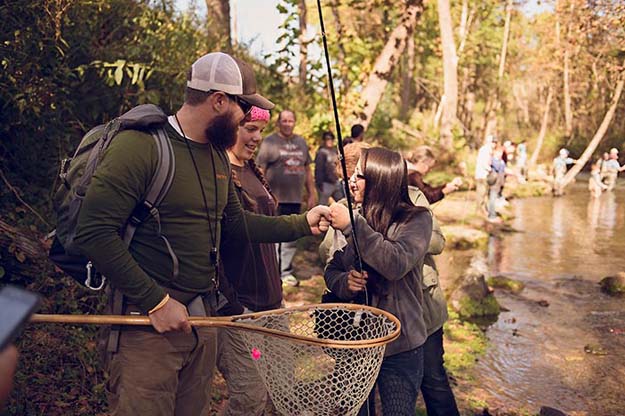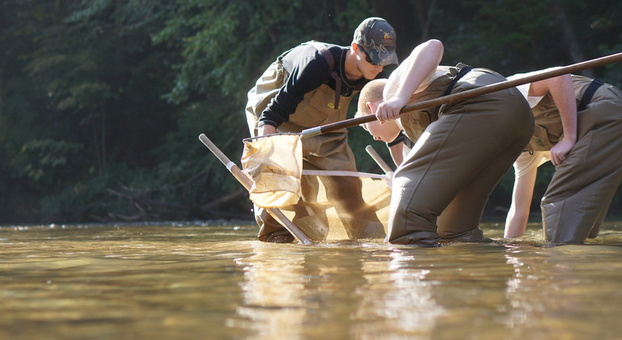
Jess Westbrook, the recipient, enjoys time on the river with The Mayfly Project participants. Photo The Mayfly Project.
Meet the 2017 Orvis Breaking Barriers Award, Recipient
Written by: Debra Carr Brox
 [dropcap]I[/dropcap]n 2015, the Breaking Barriers Awards were created to honor individuals who have gone above and beyond to bring new blood into fly fishing, to break down the barriers of introduction. Previous winners have been Chad Brown ofSoul River Runs Wild (2015), Lori-Ann Murphy of Reel Women (2015), and Nelli Williams of the Bristol Bay Fly Fishing and Guide Academy (2016). This year’s recipient has done amazing work with kids in Arkansas and Colorado.
[dropcap]I[/dropcap]n 2015, the Breaking Barriers Awards were created to honor individuals who have gone above and beyond to bring new blood into fly fishing, to break down the barriers of introduction. Previous winners have been Chad Brown ofSoul River Runs Wild (2015), Lori-Ann Murphy of Reel Women (2015), and Nelli Williams of the Bristol Bay Fly Fishing and Guide Academy (2016). This year’s recipient has done amazing work with kids in Arkansas and Colorado.
On April 28, the annual Breaking Barriers award was presented to Jess Westbrook, founder of The Mayfly Project, in front of hundreds of fishing guides and industry folk at the annual Orvis Guide Rendezvous in Missoula, Montana.
Jess Westbrook started fishing when he was eight years old, but it wasn’t until three years ago that the sport took on a new meaning for him. In 2014, Westbrook and his wife, Lauren, welcomed a baby boy. Soon after, Westbrook started to experience intense anxiety attacks. In a six-month period, he lost thirty pounds, was missing work frequently, and had distanced himself from friends and family.
“A friend that I admired kept getting me out on the river, and I found that when I was there I forgot about everything but fishing,” explained Westbrook. His anxiety disappeared when he stepped into the water. “When we are fly fishing we are so concentrated on the casting, mending, presenting good drifts, et cetera, that we forget about everything else around us.”
It was during this period that Westbrook began mentoring children in foster care through an organization at his church. The timing was perfect. He was looking for a way to give back to the community through fly fishing, a sport that had helped him over some very tough hurdles.
“It broke my heart knowing that my son was going to grow up in a loving home with parents that would support him no matter what, and these kids in foster care did not have that,” explains Westbrook. “It’s hard enough growing up, especially without loving parents. They did not choose this path. Someone else’s action brought them to where they are”.
“Our hope is for the child to continue to pursue fly fishing and to have an entry point to the outdoors.”
Photo courtesy The Mayfly Project
Partnering with Kaitlin Barnhart, who also works with children in foster care, the Westbrooks found they shared the same beliefs on why fly fishing is so important to this population. Westbrook says, “During the most chaotic time in their lives, foster children could find an anchor in the outdoors and find home rivers even when they don’t feel like they have a home.”

Photography provided by Krystina Bullard.
The Mayfly Project participants are guided through five stages where they learn line management, casting techniques, knot tying, some entomology, river safety, mending tactics, hook setting, catch-and-release tactics, and the value of conservation. At the end of the five stages, each child is given his or her very own fly rod, reel, pack, fly box, flies, tippet, indicators, and more. “Our hope is for the child to continue to pursue fly fishing and to have an entry point to the outdoors,” says Westbrook.
NOTE: Featured Image – The Mayfly Project.






